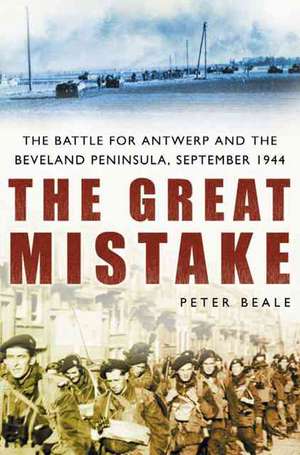The Great Mistake
Autor Peter Bealeen Limba Engleză Paperback – 18 aug 2004
Inefficient command structures, conflicts between Allied commanders and differing American and British military cultures all contributed to a huge missed opportunity, described by many historians as 'The Great Mistake'. On September 4, 1944, the British 11th Armoured Division entered Antwerp, capturing the docks intact with Belgian assistance. It was 85 days, however, before the first Allied cargo ship reached the docks on November 29. Some 80,000 soldiers of the German Fifteenth Army slipped across the Scheldt Estuary and escaped towards Germany along the Beveland peninsula. Had 11th Armoured Division immediately sealed off the peninsula where it joined the mainland, the Allies could have eliminated the Fifteenth Army and opened Antwerp's port much earlier, potentially allowing them to cross the Rhine and defeat Nazi Germany in 1944.
Preț: 136.93 lei
Nou
Puncte Express: 205
Preț estimativ în valută:
26.20€ • 28.02$ • 21.85£
26.20€ • 28.02$ • 21.85£
Carte indisponibilă temporar
Doresc să fiu notificat când acest titlu va fi disponibil:
Se trimite...
Preluare comenzi: 021 569.72.76
Specificații
ISBN-13: 9780750932868
ISBN-10: 0750932864
Pagini: 240
Ilustrații: 35 b&w illustrations
Dimensiuni: 163 x 233 x 27 mm
Greutate: 0.49 kg
Editura: The History Press Ltd
Locul publicării:United Kingdom
ISBN-10: 0750932864
Pagini: 240
Ilustrații: 35 b&w illustrations
Dimensiuni: 163 x 233 x 27 mm
Greutate: 0.49 kg
Editura: The History Press Ltd
Locul publicării:United Kingdom
Notă biografică
Peter Beale was twice wounded serving as a troop leader with the 9th Battalion Royal Tank Regiment from 1943 to 1945. After the war he obtained a degree in engineering from University College London before emigrating to Australia. He is author of Tank Tracks(1995) and Death by Design(1998) for Sutton. Peter lives in Valentine, New South Wales.
Descriere
Inefficient command structures, conflicts between Allied commanders and differing American and British military cultures all contributed to a huge missed opportunity, described by many historians as 'The Great Mistake.'
